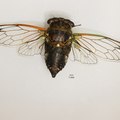Dog-day cicada
| Dog-day cicada | |
|---|---|

| |
| Scientific classification | |
| Domain: | Eukaryota |
| Kingdom: | Animalia |
| Phylum: | Arthropoda |
| Class: | Insecta |
| Order: | Hemiptera |
| Suborder: | Auchenorrhyncha |
| Family: | Cicadidae |
| Genus: | Neotibicen |
| Species: | N. canicularis
|
| Binomial name | |
| Neotibicen canicularis (Harris, 1841)
| |

| |
| Synonyms | |
|
Tibicen canicularis | |
Neotibicen canicularis, commonly called the dog-day cicada, dog-day harvestfly, or heatbug, is a species of annual cicada.
Description
[edit]
Neotibicen canicularis is recognizable by being mostly black with green markings on its body. The body size is typically 27–33 millimeters (1.1–1.3 in); the wingspan can reach 82 mm (3.2 in).[1] The wings are interlaced with green veins which are especially noticeable near the base.[1] The song of N. canicularis is often described as being a loud, high-pitched whine much like a power saw cutting wood. It lasts for several seconds before fading away at the end of the noise. Its name "dog-day" refers to dog days of summer, due to these insects often being associated with hot, humid, summer days.
Geographical locations
[edit]Common habitats are mixed and deciduous woods in Canada and the Central and Eastern United States.[2] Geographic range includes The Great Plains of Canada and the United States, the Midwestern United States, The Great Lakes region, and New England.
Gallery
[edit]-
Close-up of face showing ocelli
-
Pinned N. canicularis from central Georgia, US
-
N. canicularis cicada moulting
-
N. canicularis cicada moulting
-
N. canicularis cicada moulting
References
[edit]





